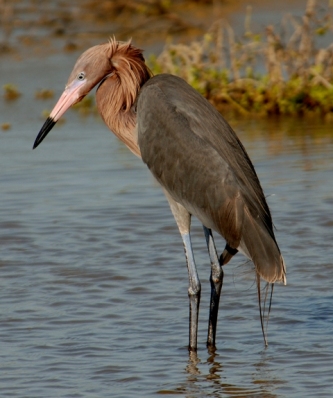
Just which birds are actually threatened by the BP fiasco? I will offer my best guesses, and then ask you to send your thoughts in as well. I will try to keep the list updated.
My list of 25 reflects those species that are generally limited to the immediate coast, whose populations are generally restricted to the Gulf of Mexico and the southern U.S. Atlantic (either throughout the year or during a specific season), and whose numbers are low and/or declining. In general I have avoided all pelagics (obviously threatened), since their numbers are relatively low in the Gulf (excepting the Dry Tortugas).
Of course, if we have a repeat of the storm surge associated with a Katrina, Rita, or Ike, all bets are off. Such a storm would push oil well inland, and an entirely new suite of birds would be at risk. In addition, an Ike-type storm, moving from east to west, would spread surface oil and put the Texas coast more at risk. If that happened (particularly if the oil makes it to the southern tip of the state) then all whooping cranes are at risk, as well as the species such as redhead that winter in the Laguna Madre.
Speculation about possible impacts from a hurricane have been all over the map. Here is a quote from Dr. Jeff Masters of Weather Underground. I urge all to read his entire article. His discussion of the potential effect of storm surge is enlightening (and frightening). As one with a house on Galveston Island, and the unwilling recipient of 3 feet of storm surge from Ike, I can only imagine the impacts of oil floating atop those waters.
A hurricane moving through the Gulf of Mexico spill will very likely make the disaster much worse, spreading out the oil over a larger region, and bringing the oil to shores that otherwise might not have seen oil…Jeff Masters
Even if all of the oil evaporated tomorrow (we wish), the Deepwater Horizon blowout is a moment when the America people can see what is at risk from treating the Gulf as if it were an industrial park.
- Fulvous whistling-duck
- Mottled duck
- Lesser scaup
- Red-breasted merganser
- Common loon
- Eared grebe
- Northern gannet
- Neotropic cormorant
- Reddish egret
- Roseate spoonbill
- Clapper rail
- Whooping crane (Florida)
- Snowy plover
- Wilson’s plover
- Piping plover
- American oystercatcher
- Red knot
- Franklin’s gull
- Least tern
- Black tern
- Royal tern
- Black skimmer
- Horned lark (coastal)
- Nelson’s sharp-tailed sparrow
- Seaside sparrow
